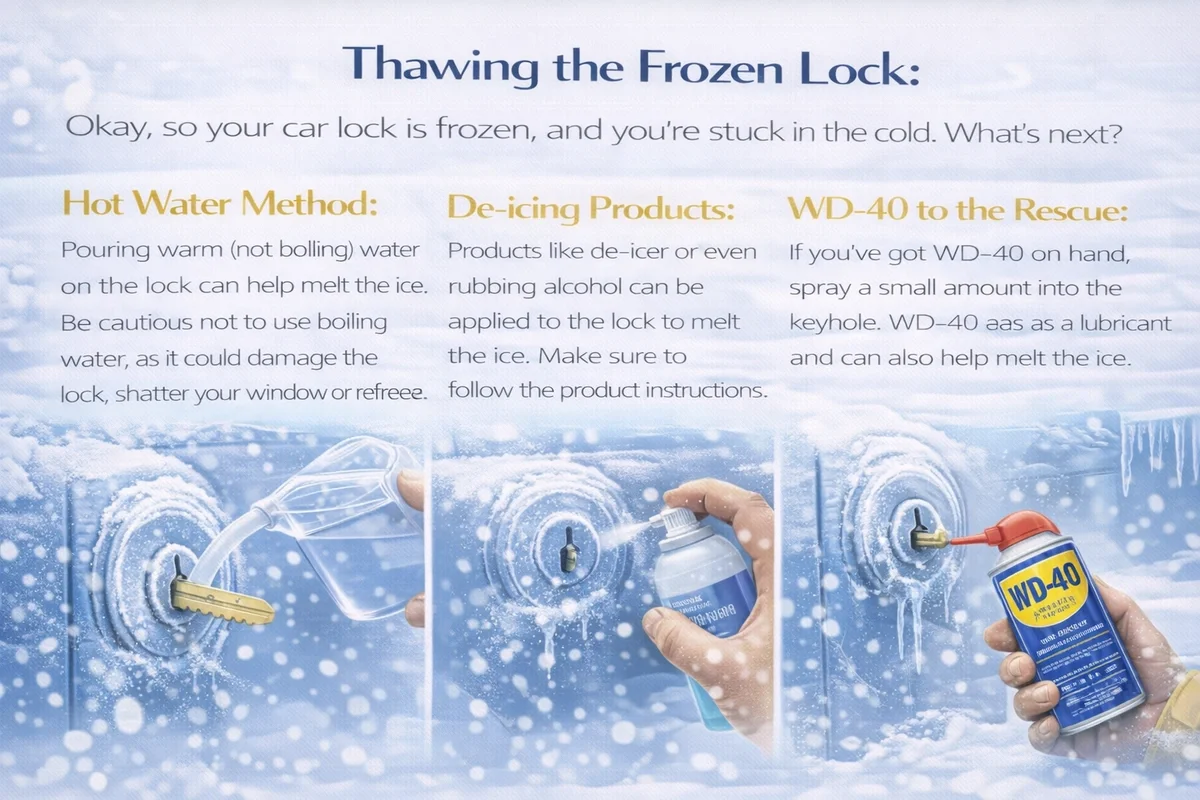Frozen Car Lock: A Winter Survival Guide for Drivers
As the winter chill settles in, drivers in cold states and snow enthusiasts face a common adversary – frozen car locks. Imagine fumbling with your keys, trying to turn them in the lock, but met with stubborn resistance. Could it be a frozen lock or just a tough day for your keys? The first step is to identify the issue.
If you find yourself in freezing temperatures or recently moved to a cold state, there's a high chance your car lock is frozen. The metal components contract in the cold, causing the lock mechanism to seize up.
“In cold climates, frozen car locks are far more common than most drivers realize. If the key won’t turn after a temperature drop, ice—not a broken lock—is often the culprit.” - KeyMe Locksmiths
The What and Why:
So, what exactly happens when your car lock freezes? As temperatures drop, any moisture around the lock can turn into ice, rendering the lock mechanism immobile. This is especially common for those not accustomed to the snowy weather or for cars left exposed to the elements.
“When moisture freezes inside a lock cylinder, even slight ice buildup can stop internal pins from moving. Forcing the key at this point often causes more damage than the cold itself.” - KeyMe Locksmiths
Prevention is Key:
Now that you've identified the issue, let's talk about prevention. How can you shield your car lock from the icy grip of winter?
- Car Lock Lubricant: Regularly applying a silicone-based or graphite lubricant can help keep the lock mechanism smooth and less prone to freezing.
- De-icing Spray: Keep a de-icing spray handy. Spritzing it into the keyhole can melt the ice and prevent further freezing.
- Car Lock Heater: Invest in a car lock heater that can be attached to your vehicle. These devices generate enough heat to prevent freezing.
Thawing the Frozen Lock:
Okay, so your car lock is frozen, and you're stuck in the cold. What's next?
- Hot Water Method: Pouring warm (not boiling) water on the lock can help melt the ice. Be cautious not to use boiling water, as it could damage the lock, shatter your window or refreeze.
- De-icing Products: Products like de-icer or even rubbing alcohol can be applied to the lock to melt the ice. Make sure to follow the product instructions.
- WD-40 to the Rescue: If you've got WD-40 on hand, spray a small amount into the keyhole. WD-40 acts as a lubricant and can also help melt the ice.
When to Call a Locksmith:
Despite your best efforts, there are situations where the lock might be damaged or the key won't turn. If you've attempted multiple methods and the lock remains unyielding, it's time to call in the professionals.
A locksmith can assess the situation, determine if there's any damage, and provide a swift solution to get you back on the road. It's a small price to pay for a stress-free resolution.
Winter may bring its challenges, but with a little preparation and the right knowledge, you can conquer the frozen car lock blues. From preventive measures to DIY thawing techniques, this guide is your companion in navigating the icy terrains of winter driving.
Remember, a well-maintained and prepared driver is a confident driver. Stay warm, stay prepared, and keep those locks frost-free!
“If thawing methods don’t work quickly, it’s best to stop and call a professional. Continuing to force a frozen lock can snap the key or damage the cylinder—turning a simple winter issue into a costly repair.” - KeyMe Locksmiths
About KeyMe Locksmiths
KeyMe Locksmiths is a leading provider of local locksmith services and key copy kiosks across 50 states and the District of Columbia. Proud to serve over 5 million customers, KeyMe Locksmiths cuts over 10 million keys annually. With more than 7,500 self-service kiosks in major retailers, an e-commerce platform delivering over 10,000 keys weekly, and a nationwide locksmith network, KeyMe Locksmiths provides fast, reliable solutions for residential, commercial, and vehicle needs. KeyMe Locksmiths is committed to delivering exceptional service backed by a 100% money-back guarantee. KeyMe Locksmiths also operates one of the nation’s leading retail media networks, connecting consumers to other brands seeking to advertise in-store and delivering over 2B monthly impressions.


